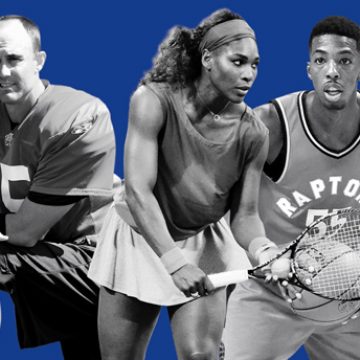Litigators and athletes thrive on the same thing: competition. In the courtroom and in the world of sports, there’s usually a winner and a loser. It’s no surprise, then, that some of Toronto’s top litigators are also big-time sports fans. We asked three of them to tell us their athletic role model, so we could learn how their legal practice is similar to — and different than — the in-game strategy of their favourite star.
Erin Kuzz 
Partner, Sherrard Kuzz LLP
Athlete she admires: Ricky Ray
Kuzz is a lifelong CFL fan. Now based in Toronto, Kuzz spent her childhood in Alberta watching as her parents got bundled up every winter to go to the football stadium. Lucky for Kuzz, Edmonton’s all-star quarterback, Ricky Ray, moved to the Toronto Argonauts in 2011. He’s the CFL’s only starting quarterback with a record of four Grey Cup wins.
What makes them similar: “Ricky Ray believes teams win because of their preparation, which is what I’ve always believed. When working on a case, I lock myself in a boardroom and spread my materials across the table in front of me. My colleagues call it the ‘satellite office.’ I’ll sit there for days. Your best chance at winning a case is by out-prepping the other side.”
What makes them different: “Litigators, as a group, tend not to be as resilient as professional athletes, who seem to bounce back much faster. Athletes lose a game and it sucks, but they shake it off and play next week. Ray is really good at that. Most litigators could learn from him. We take losses hard. We can’t shake them off. There are cases I’ve lost years ago that still bug me.”
 Sunira Chaudhri
Sunira Chaudhri
Partner, Levitt LLP
Athlete she admires: Serena Williams
Chaudhri believes tennis is one of the only sports where women are revered as much as men, and Serena Williams has a lot to do with that. Williams’s charisma and physical strength have won over the hearts of millions, including Chaudhri.
What makes them similar: “Serena is a great role model for anyone who strives to be successful. I think she’s found efficiencies in her game — think of her powerful serve, which keeps her out of long, tiring rallies. Every day, I try to find productivity hacks in my practice. If I use my time effectively to do work, I have more time to develop business and discuss case strategy with clients.”
What makes them different: “In litigation, unlike tennis, there’s always more than one ball in play at any given time — I’m managing the relationship with my client and with the other side. Facts change all the time. A case that looks like a lost cause could turn into a win, as things change week by week. In some ways, it can be a lot different than tennis.”
 Tina Lie
Tina Lie
Partner, Paliare Roland Rosenberg Rothstein LLP
Athlete she admires: Delon Wright
In just his third season in the NBA, Delon Wright has become an integral part of the Toronto Raptors. Wright, who is only 25 years old, is no superstar. But when he comes off the bench, he performs. And Lie loves to watch.
What makes them similar: “He has a great work ethic and he’s crafty. He’s not a starter, but when he comes off the bench, he recognizes his role: to help his team win, not to be the all-star. That resonates with me because, even though I’ve been practising for 10 years, I sometimes junior cases. The supporting role is just as important as being the star.”
What makes them different: “In basketball there’s always a winner and a loser. In litigation, that’s mostly true. But sometimes, it’s about coming to a compromise. Most cases settle these days — it’s often in my client’s interest to settle.”
 This story is from our Spring 2018 Issue.
This story is from our Spring 2018 Issue.
Photo of Ricky Ray by Mike F. Campbell; Photo of Serena Williams by Edwin Martinez; Photo of Delon Wright by Getty Images.


